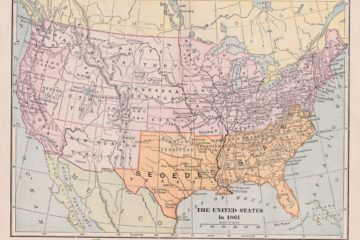
Comparing the 1860 and 2020 Elections: Is the USA Heading for Another Civil War?
All summer, as protests raged over the United States, fears grew that an increasingly polarised United States was heading for another civil war. There was great worry over violence erupting across the land, and a distinct sense that there were at least two rival and distinct Americas in the country: Red America and Blue America. Political movements such as the Lincoln Project and the Wide Awake Boys explicitly made comparisons between the present time and the Civil War-era. Almost two thirds of Americans, in May 2020, believed that the country was close to civil war. The 2020 presidential election might therefore have the same effect as that of 1860 election: then, the election of Abraham Lincoln as President persuaded the …
When Attempts to Change Institutions Fail: The Case of the Affordable Care Act
The U.S. Supreme Court’s recent decision to uphold the Affordable Care Act (ACA, also known as Obamacare) is the latest in a series of failed attempts by Republicans to repeal the law. From its passage in 2010, the ACA has been responsible for reducing the uninsured population significantly through its key provisions requiring individuals to purchase health insurance, extending coverage for individuals with pre-existing conditions, and expanding Medicaid for low-income Americans¹. Republican legal challenges to the ACA started within hours of its signing. Filed by states, associations, and individuals, several cases made it to the Supreme Court, which rejected challenges to the ACA in 2012, 2015, and, most recently, June 2021. These legal defeats coincide with other failed attempts by …
A Very Spanish Coup: What Can America Learn from the 1981 Spanish Coup
The storming of the American Capitol building on the 6th of January 2021 during a session to formalize Joe Biden’s presidential victory made headlines around the world. For many Americans, the fact that there was an armed attempt to disrupt a democratic transition of power was a worrying sign of democratic backsliding and the consequence of years of extreme partisanship. The siege suggested a grim vision of America’s political future. However, 40 years ago, the Spanish political system was able to recover from a similar event, in what could be an instructive experience for contemporary America. In February 1981, the Spanish political system, which had rapidly democratised following the death of General Francisco Franco in 1975, faced its first real …
OxPol Blogcast Episode 5: Biden’s North Korea Policy
Welcome to the OxPol Blogcast, a podcast where we will be sharing research, analysis, and experiences from members of the University of Oxford’s Department of Politics and International Relations. On each, episode we will talk to a guest about a piece they’ve written for the OxPol Blog. Then, we’ll discuss their larger research agenda, their insights on conducting political science, and their time at Oxford. On this episode of the OxPol BlogCast, host Chase Harrison talks to Stipendiary Lecturer in Politics Edward Howell about Biden’s policy on North Korea, regional relations around the Korean Peninsula, and exact you conducts research on a notoriously closed off country like North Korea. Read the original blog post here: https://blog.politics.ox.ac.uk/washington-and-pyongyang-back-to-square-one/
Washington and Pyongyang: Back to Square One?
US administrations may change, but the North Korean problem, in all its guises, has plagued the United States for at least the past thirty years. The new Commander-in-Chief, Joe Biden, and his administration are facing increasing calls from the broader international community to clarify US policy towards East Asia, which includes China, Japan, and the two Koreas. The last Democratic administration, that of Barack Obama, focused on strengthening US bilateral alliances within the East Asian region, regional stability, and bolstering relationships with emerging powers. Yet, it did not fully address one of the greatest geopolitical challenges in the region: North Korea’s nuclear program. During the Obama administration, North Korea conducted four nuclear tests, one of which it claimed to be …

Recovering from SolarWinds: Three Cybersecurity Priorities for the Biden Administration
Since January 20th, the Biden administration has been focused above all else on tackling Covid-19 and passing a landmark economic relief bill. This is unsurprising. In the context of a global pandemic, with an urgent vaccine rollout taking place, the US government must prioritise tackling Covid-19 and its economic consequences. However, President Biden has a raft of additional problems waiting at his doorstep. In particular, the US faces a two-pronged cybersecurity crisis: the impact of a vast cybersecurity breach known as the SolarWinds attack that was likely perpetrated by Russian intelligence, coupled with the fallout from Trump’s ‘legacy of cyber confusion’. This leaves Biden with three tasks. First, he must deal with the immediate consequences of SolarWinds: identifying what data has been compromised and doing everything possible to patch exploited systems. Next, he must hold Russia accountable …

OxPol Blogcast Episode 3: Drug Legalisation Referendums
Welcome to the OxPol Blogcast, a podcast where we will be sharing research, analysis, and experiences from members of the University of Oxford’s Department of Politics and International Relations. On each, episode we will talk to a guest about a piece they’ve written for the OxPol Blog. Then, we’ll discuss their larger research agenda, their insights on conducting political science, and their time at Oxford. On the 3rd episode of the OxPol BlogCast, host Chase Harrison talks to recent DPhil graduate Jonas von Hoffman about the results of recent drug legalisation referendums in the United States. We compare those to legalisation movements across the Americas before chatting about his experience studying a more taboo topic in academia.
Biden, López Obrador and the politics of migration: a return to the status quo?
Joe Biden’s presidential victory has brought temporary relief for many undocumented and mixed-status families in the US. Biden promised to reverse several of Trump’s executive orders on immigration and refugee policy within his first 100 days in office including reinstating the Deferred Action for Childhood Arrivals (DACA) program, ending the Migrant Protection Protocols (MPP) also known as “Remain in Mexico,” and creating a “road map” to citizenship for the approximate 10.5 million undocumented immigrants in the US. While Biden’s immigration agenda contains federal and local level priorities, little emphasis has yet been placed on the bilateral scale with the US’s southern neighbour, Mexico. Yet, bilateral immigration negotiations should be a priority for administrations on both sides of the border. In …

Marijuana Legalization by Blunt Force: A Decade of US Policymaking through Ballot Initiatives
Election day 2020 was another big moment for drug policy reform in the US as voters across diverse states rejected the status quo and endorsed liberalizing drug laws. Arizona, Montana, New Jersey and South Dakota legalized marijuana for recreational purposes as the news proclaimed voters had “just said no to America’s war on drugs,” calling it “a banner year for drug decriminalization.” That election day brought significant wins for drug policy reform is not new. Beginning in 2012 with Colorado and Washington state, 13 out of the 15 states that have legalized recreational cannabis thus far have done so through ballot measures.[1] In 2014, Alaska and Oregon followed suit along with Nevada, Massachusetts, Maine and California in 2016 and Michigan …









